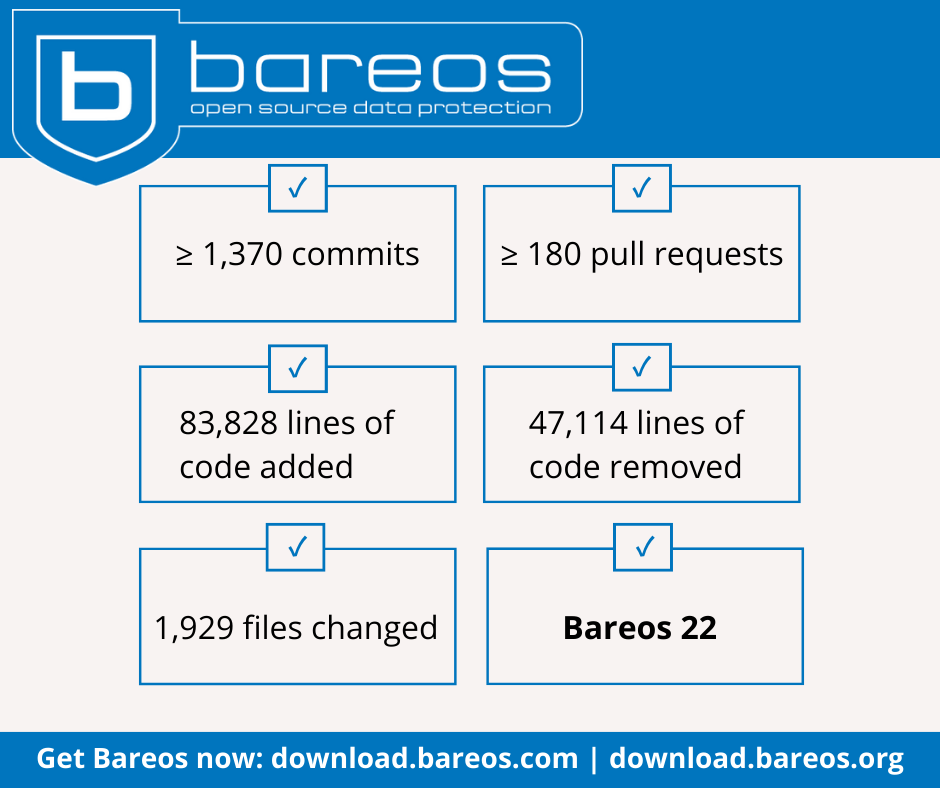We have just published a new major version of our Open Source backup solution. Among other things, the Bareos 22 release contains an enhanced VMware plugin, major performance improvements, and a technical preview of the new Checkpoints feature.
Bareos 22 contains over 83,800 lines of new code, the developers have deleted over 47,100 lines and modified more than 1,900 files. Besides, the developers have further modernized the Bareos code, improved existing plugins and increased the I/O performance of Python plugins for the Bareos File Daemon. Bareos 22 also includes a first version of a brand new feature: backup checkpoints allow restoring files from not yet completed jobs. This article introduces the Bareos 22 release and its new features.

Enhanced VMware Plugin
The VMware plugin has been creating full and incremental backups since Bareos 15.2. While the plugin could only restore existing virtual machines (VM) in earlier versions, it is also possible to create new VMs from the backups as of Bareos 22. Administrators can now select folders, hosts, clusters, or datastores for this purpose. To avoid conflicts with other VMs, the VMware UUID and MAC address can be regenerated. In addition, a restore is now also possible via the Bareos WebUI.
The developers have upgraded the VDDK (Virtual Disk Development Kit) to the current version 8.0.0. The plugin now supports vSphere 8 and is backward compatible with vSphere 6.7 and 7.
Increased I/O Performance of Python Plugins
Python plugins for the Bareos File Daemon (FD) now support direct I/O in the Bareos core, instead of having to take a diversion via the Python code for read and write. This may not be possible or useful for every plugin, but appropriately adapted plugins can double their performance. A backup via the Python plugin is now just as fast as a backup directly via the File Daemon.
Optimized Support for Ceph
In future, only the Droplet Storage Backend is used to back up Ceph storage. As described in the Bareos documentation, it backs up Ceph targets via S3 and thus guarantees optimal performance. If Ceph is the source, it’s mounted in the regular file system and the standard File Daemon takes care of the backup.
The developers have removed the deprecated RADOS/Ceph backend and the Cephfs plugin. If previously installed, the packages bareos-storage-ceph and bareos-filedaemon-ceph-plugin need to be removed manually.
New Packages and Features
Bareos 22 consolidates several RHEL platforms and now provides one single package for the derivatives. The developers have also added Ubuntu 22.04, Fedora 36 and 37, RHEL 9 derivatives (Rocky Linux, AlmaLinux, Oracle Linux, CentOS Stream), and openSUSE/SLES 15.4 to the list of supported distributions.
Packages for compatible platforms (RHEL derivatives, openSUSE/SLES, Debian/Univention Corporate Server) are only built once. The automated tests against all platforms remain. As a result, the number of download directories of the repositories is reduced. Bareos is also switching the community version to a rolling release scheme.
The developers have further modernized the Bareos code and revised it to comply with the C++20 standard. Since there are no suitable C++20 compilers for all platforms yet, the code is still compiled with C++17 options.
As a Tech Preview, the developers have introduced a first version of the so-called backup checkpoints. The feature allows restoring from incomplete backup jobs. As of Bareos 22, it is possible to restore already backed up files from backup jobs that have not yet been successfully completed. Future releases will be able to resume failed or incomplete jobs.
For more information, please see our press release. Packages and release notes are now available on our download servers.
- Subscription Repository: https://download.bareos.com/bareos/release/22
- Community Repository: https://download.bareos.org/next/
- Release Notes: https://docs.bareos.org/Appendix/ReleaseNotes.html
- GitHub Repository: https://github.com/bareos/bareos/
